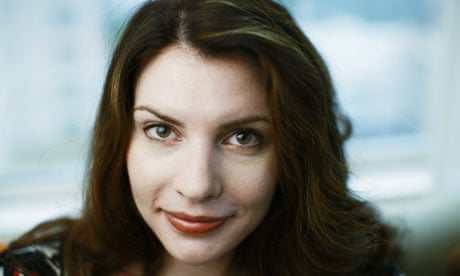Queen of teen vampire romance Stephenie Meyer has topped every bestseller chart going but she has now made it onto a less coveted chart, after her Twilight books joined the ranks of those most frequently requested to be banned from US libraries.
Meyer's novels, about the romance between a human teenage girl and a vampire, came fifth on the American Library Association's list of books which people tried hardest to ban in the last year. This is the first time the Mormon author's novels have appeared in the line-up – JK Rowling and Philip Pullman are both veterans of the list – with complaints about both their level of sexual explicitness and their "religious viewpoint".
"It is the books which are read frequently which are frequently challenged – with all the hype around Twilight and the movies and the celebrities I was actually surprised Meyer's books weren't higher," said Angela Maycock at the ALA's office for intellectual freedom. Vampire books in general accumulated a host of complaints last year, Maycock said, with "the idea of vampires and other supernatural entities in opposition to certain religious viewpoints". JK Rowling doesn't make it into this year's list but her Harry Potter books were the most challenged of the last decade, the ALA said today, with complaints over their "satanism" and "anti-family themes".
The most challenged books of 2009 were Lauren Myracle's young adult series of books TTYL, written entirely in the style of instant messaging. A host of objections were made to Myracle's books – over their language, coverage of drugs and sexual explicitness. "These books deal realistically with young adult lives – the ickyness, the weirdness of adolescence and the difficult situations lots of teens face," said Maycock. "Twilight of course deals with adolescence too, but is very much about the supernatural. It's interesting that both realism and fantasy are causing high levels of concern."
Justin Richardson and Peter Parnell's And Tango Makes Three, a children's book about two male penguins bringing up an orphaned chick which has topped the list for the last three years, slipped into second place, while Philip Pullman fell out of the list altogether.
Instead, the late JD Salinger's iconic novel of teenage rebellion The Catcher in the Rye, which has provoked a storm of complaints – from being "anti-white" and "obscene" to being "centred around negative activity" and "a filthy, filthy book" – ever since it was published more than 50 years ago, returned to the list of most challenged books after a four-year absence. "It's really a very cherished favourite for many readers so seeing it there can be shocking. People might ask 'are we still having problems with Catcher in the Rye?' The truth is, yes we are. It's a classic because of many of the things which make it potentially objectionable, including the language used and the fact that Holden Caulfield is really a classic non-conformist. That can be scary," said Maycock.
Another classic title, Harper Lee's To Kill a Mockingbird, was the fourth most challenged book in 2009, for "racism" and "offensive language". "Similar to The Adventures of Huckleberry Finn, Lee uses the language of a certain time but the use is to put forward a very strongly anti-racist message, so it is really a shame that one particular word makes a book objectionable when the message of the book is exactly the opposite," said Maycock.
Last year, the ALA received 460 reports about efforts to remove books from the shelves of schools or libraries for being inappropriate, down from 513 challenges last year. But the association estimates that its statistics only represent 20-25% of the complaints that actually occur. The ALA said it was aware of 81 instances in which materials were actually removed from schools and libraries last year, including copies of Brave New World, The Kite Runner, Black Hawk Down and To Kill a Mockingbird.
"Even though not every book will be right for every reader, the ability to read, speak, think and express ourselves freely are core American values," said Barbara Jones, director of the ALA's office for intellectual freedom. "Protecting one of our most fundamental rights - the freedom to read - means respecting each other's differences and the right of all people to choose for themselves what they and their families read."
The top 10 titles most challenged titles of 2009 were:
1. TTYL; TTFN; L8R, G8R (series) by Lauren Myracle
Reasons: Nudity, Sexually Explicit, Offensive Language, Unsuited to Age Group, Drugs
2. And Tango Makes Three by Peter Parnell and Justin Richardson
Reasons: Homosexuality
3. The Perks of Being A Wallflower by Stephen Chbosky
Reasons: Homosexuality, Sexually Explicit, Anti-Family, Offensive Language, Religious Viewpoint, Unsuited to Age Group, Drugs, Suicide
4. To Kill a Mockingbird by Harper Lee
Reasons: Racism, Offensive Language, Unsuited to Age Group
5. Twilight (series) by Stephenie Meyer
Reasons: Sexually Explicit, Religious Viewpoint, Unsuited to Age Group
6. The Catcher in the Rye by JD Salinger
Reasons: Sexually Explicit, Offensive Language, Unsuited to Age Group
7. My Sister's Keeper by Jodi Picoult
Reasons: Sexism, Homosexuality, Sexually Explicit, Offensive Language, Religious Viewpoint, Unsuited to Age Group, Drugs, Suicide, Violence
8. The Earth, My Butt, and Other Big, Round Things, by Carolyn Mackler
Reasons: Sexually Explicit, Offensive Language, Unsuited to Age Group
9. The Color Purple by Alice Walker
Reasons: Sexually Explicit, Offensive Language, Unsuited to Age Group
10. The Chocolate War by Robert Cormier
Reasons: Nudity, Sexually Explicit, Offensive Language, Unsuited to Age Group
